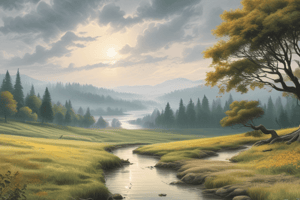Podcast
Questions and Answers
What is the central theme of Robert Frost's poem 'Dust of Snow'?
What is the central theme of Robert Frost's poem 'Dust of Snow'?
- The significance of winter in rural living
- The defiance of human intervention in nature
- The importance of laughter in nature
- The transience of nature's beauty (correct)
What does the speaker observe happening to the leaves in 'Dust of Snow'?
What does the speaker observe happening to the leaves in 'Dust of Snow'?
- They turn into snowflakes
- They burst into flame
- They dissolve into the ground
- They are collected by children (correct)
When was 'Dust of Snow' composed by Robert Frost?
When was 'Dust of Snow' composed by Robert Frost?
- At the beginning of his writing career
- While on a trip to Europe
- Shortly after his move to New Hampshire (correct)
- During his later years in Massachusetts
Which of the following best represents the essence of Robert Frost's poetry?
Which of the following best represents the essence of Robert Frost's poetry?
What is the significance of line two in 'Dust of Snow'?
What is the significance of line two in 'Dust of Snow'?
How does 'Dust of Snow' depict the changing seasons?
How does 'Dust of Snow' depict the changing seasons?
What is the main theme of the poem 'Dust of Snow' as discussed in the text?
What is the main theme of the poem 'Dust of Snow' as discussed in the text?
In the context of 'Dust of Snow,' what does the fallen leaves being carried away by the wind symbolize?
In the context of 'Dust of Snow,' what does the fallen leaves being carried away by the wind symbolize?
What effect does the poem 'Dust of Snow' have on readers, according to the text?
What effect does the poem 'Dust of Snow' have on readers, according to the text?
What does the concluding part of 'Dust of Snow,' where it leaves room for readers to fill in the blanks, suggest?
What does the concluding part of 'Dust of Snow,' where it leaves room for readers to fill in the blanks, suggest?
'Dust of Snow' is described as an essential addition to Robert Frost's body of work because it showcases his genius for what?
'Dust of Snow' is described as an essential addition to Robert Frost's body of work because it showcases his genius for what?
What is one reason why 'Dust of Snow' continues to resonate among readers?
What is one reason why 'Dust of Snow' continues to resonate among readers?
Flashcards are hidden until you start studying
Study Notes
"Dust of Snow" by Robert Frost: A Poetic Reflection On Nature's Transience
Robert Frost penned his brief yet powerful poem, "Dust of Snow," during the early stages of his illustrious career—a mere six years after moving from Massachusetts to New Hampshire. This haiku-like composition delves into our relationship with nature through the eyes of the poet and captures the fleeting beauty found within simple natural occurrences.
The four lines of this timeless piece are as follows:
The last leaves falling to the ground, That space filled up once more with leaves; To see it lifted by a child, Whose father laughed and pointed out beyond.
Background on Robert Frost
Born on March 26, 1874, Robert Lee Frost was one of America’s most celebrated poets of the twentieth century. He authored numerous volumes of poetry throughout his life, often exploring themes related to rural living and human interaction with nature. "Dust of Snow" epitomizes these themes in its profound simplicity.
Analysis of "Dust of Snow"
Upon first glance, "Dust of Snow" introduces us to the final moments of autumnal foliage. As winter approaches, the trees shed their remaining leaves, forming a carpet beneath them. The speaker observes how Mother Nature reclaims her domain when another season arrives, filling spaces previously occupied by vegetation. In line two, we learn about the cyclical nature of growth, decay, and renewal inherent within the natural world.
Line three offers a heartwarming image of youthful wonderment, exemplified by a curious child who revels in the experience of seeing the fallen leaves being carried away by the wind. We sense the delight expressed by both the youngster and their amused parent, highlighting the endearing bond between generations. Moreover, this vignette underscores humanity's innate connection to the organic cycle of nature, which is often lost amidst modernity's fast pace.
Intriguingly, "Dust of Snow" concludes without specifying where the child and their father look, leaving room for readers themselves to fill in the blanks and perhaps reflect upon what lies beyond the visible realm of changing seasons and transient beauty.
Legacy of "Dust of Snow"
Frost's enchanting poem has become synonymous with the lure of the natural world, serving as a reminder that even seemingly insignificant events like leaf fall can hold profound meaning if observed closely enough. "Dust of Snow" continues to resonate among readers as they relate to its universal theme of change and transition, evoking memories of similar experiences and inspiring newfound admiration towards our planet. It remains an essential addition to Frost's prolific body of work, showcasing his genius for distilling complex ideas into succinct verses accessible to all ages.
Studying That Suits You
Use AI to generate personalized quizzes and flashcards to suit your learning preferences.



